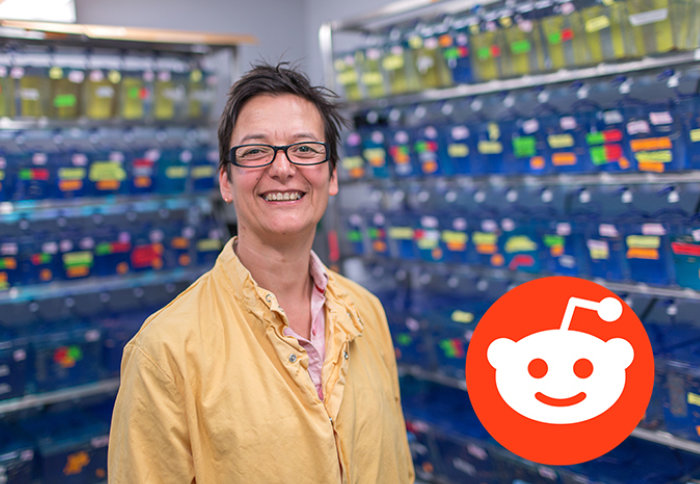Inflammatory disease and animal research expert shares insights in Reddit AMA

In a live Reddit 'Ask Me Anything', Dr Laurence Bugeon shared insights into how inflammation is mediated by bad lifestyle habits.
In the latest of a series of animal research Ask Me Anything (AMA) sessions Dr Bugeon and PhD student Madina Wane held the Reddit Q&A on Wednesday 31 July on the social media channel’s IAmA subreddit to talk about how zebrafish as animal models are revolutionising their field. Visit the AMA page to read the full transcript.
Lung inflammations, tropical fish and lifestyle
Inflammatory diseases of the respiratory system such as asthma and chronic obstructive pulmonary disease are increasing globally and remain poorly understood conditions. Cigarette smoke predisposes the respiratory tissue to a higher incidence of inflammatory disease, but it is becoming increasingly apparent that there is also a need to understand the contributions and interactions between innate immune cells and the epithelial lining of the respiratory system, which are still poorly understood.
Dr Laurence Bugeon, who is based in Imperial’s Department of Life Sciences and her research team aim to understand how bad lifestyle, including cigarette smoke, leads to induction of inflammation on the respiratory epithelium, which then drives lung inflammatory diseases.

As described in the AMA, conventional experimental models have been used for years leading to important discoveries. However, there is a need for the development of new in vivo models to enable generation of new treatments that could help to prevent mucosal inflammatory conditions. Dr Bugeon’s team use zebrafish as a model organism to understand the molecular and cellular mechanisms of inflammation mediated by a bad lifestyle.
Using zebrafish, Dr Bugeon and her team found that an acute exposure to cigarette smoke extracts induces proinflammatory gene expression in the gills of zebrafish. Moreover, a longer-term exposure leads to structural changes of the gill tissue. This shows that zebrafish gills provide an alternative model for understanding the molecular mechanisms underlying immunity within a respiratory epithelium.
However, animal research is not undertaken lightly, and use of zebrafish as animal models is highly regulated, as for mammalian models. Dr Bugeon’s dedication to animal welfare is reflected in her role as a member of Imperial ethical committees. These committees aim to oversee, at different levels, the animal research activities at the College and implement and promote the development of best practice in animal research.
A popular fish: About the AMA
The Reddit community showed great interest in the topic and in the use of zebrafish as models. Several questions focused on how Dr Budgeon’s team use zebrafish and how this model has helped them in their research field.
“They are similar enough to us and we know a lot about them in fact. They share most of their genes with us. The main attraction here is that we can image their organs easily and see what's happening in the live animal. Mouse are also widely used for this type of research but we are looking at new insights,” she said in one of her replies.
A great number of users were also interested to know more about the relation between lifestyles and health conditions like food allergies and respiratory disease. Speaking from a personal perspective, Dr Budgeon said in response to one particular question about nutrition: “I try eating a lot of vegetables and some fruits. I eat some fish and meat. Cook from scratch all ingredients. Avoid processed and ready meals or take-away, I avoid high levels of salt, sugar, processed oil, cured meat. I love fermenting stuff”.
As happened in previous AMAs, the session engaged the general public as well as other experts in the field, who actively followed the session and even contributed to some of the answers.
This AMA was the fourth held with an Imperial researcher talking about the use of animals in science. In line with the Imperial involvement in the Concordat on Openness on Animal Research (May 2014), these AMAs with researchers aim to contribute to the dissemination and improvement regarding the principles of the 3Rs (Reduction, Replacement, Refinement) at the College and in the scientific community.
Article text (excluding photos or graphics) © Imperial College London.
Photos and graphics subject to third party copyright used with permission or © Imperial College London.
Reporter
Press Office
Communications and Public Affairs
- Email: press.office@imperial.ac.uk
